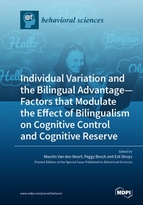Individual Variation and the Bilingual Advantage - Factors that Modulate the Effect of Bilingualism on Cognitive Control and Cognitive Reserve
A special issue of Behavioral Sciences (ISSN 2076-328X).
Deadline for manuscript submissions: closed (28 February 2019) | Viewed by 96478
Special Issue Editors
Interests: bilingualism; second language acquisition; working memory; schizophrenia; depression; sleep disorders; Parkinson's disease; fMRI; TMS
Special Issues, Collections and Topics in MDPI journals
Interests: schizophrenia; depression; sleep disorders; acupuncture; fMRI; TMS
Special Issues, Collections and Topics in MDPI journals
Special Issue Information
Dear Colleagues,
The number of bilingual and multilingual speakers is steadily growing. How do bilinguals manage two or more language systems in their daily interactions and how does being bilingual/multilingual affect brain functioning and vice versa? Previous research showed that cognitive control plays a key role during bilingual language management. This hypothesis is further supported by the fact that foreign languages were found to affect not only the expected linguistic domains, but surprisingly, also other non-linguistic domains, such as cognitive control, attention, inhibition, working memory, etc. Somehow learning languages seems to affect executive/brain functioning. This is in the literature referred to as the bilingual advantage, meaning that people who learn two or more languages seem to outperform monolinguals in executive functioning skills. In this special issue, we will first present studies that investigate the bilingual advantage; moreover, we will go one step further as well, by focusing on factors that modulate the effect of bilingualism on cognitive control. We welcome all submissions related to the above mentioned topics and also from various disciplines; i.e., linguistics, psycholinguistics, psychology, cognitive neuroscience, and neuroscience.
Prof. Dr. Maurits van den Noort
Dr. Peggy Bosch
Prof. Dr. Esli Struys
Guest Editors
Manuscript Submission Information
Manuscripts should be submitted online at www.mdpi.com by registering and logging in to this website. Once you are registered, click here to go to the submission form. Manuscripts can be submitted until the deadline. All submissions that pass pre-check are peer-reviewed. Accepted papers will be published continuously in the journal (as soon as accepted) and will be listed together on the special issue website. Research articles, review articles as well as short communications are invited. For planned papers, a title and short abstract (about 100 words) can be sent to the Editorial Office for announcement on this website.
Submitted manuscripts should not have been published previously, nor be under consideration for publication elsewhere (except conference proceedings papers). All manuscripts are thoroughly refereed through a single-blind peer-review process. A guide for authors and other relevant information for submission of manuscripts is available on the Instructions for Authors page. Behavioral Sciences is an international peer-reviewed open access monthly journal published by MDPI.
Please visit the Instructions for Authors page before submitting a manuscript. The Article Processing Charge (APC) for publication in this open access journal is 2200 CHF (Swiss Francs). Submitted papers should be well formatted and use good English. Authors may use MDPI's English editing service prior to publication or during author revisions.
Keywords
- Bilingualism
- Executive Functioning
- Bilingual Advantage
- Cognitive Control
- Individual Variation








